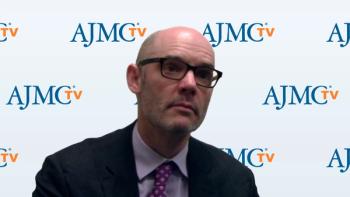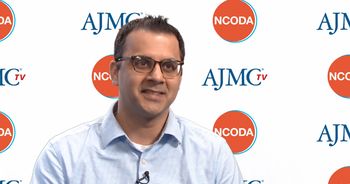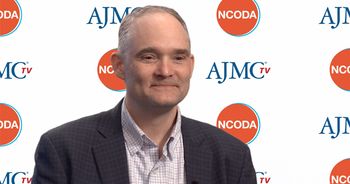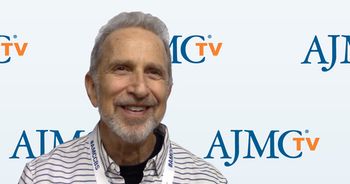
An educational session helps oncologists understand the decision-making process for selecting treatments for recurrent ovarian cancer.

An educational session helps oncologists understand the decision-making process for selecting treatments for recurrent ovarian cancer.

Having healthcare professionals with different sets of experiences or different training can help create better solutions and improve patient outcomes, explained Scott Page, PhD, the Leonid Hurwicz Collegiate Professor of Complex Systems, Political Science, and Economics at the University of Michigan.

Clinical trials, and offering patients support to take part in them, can extend lives of patients with ovarian cancer, according to a researcher from the Medical College of Georgia. But another analysis finds that gynecologial cancers are low on the government's funding priority list.

When making changes in healthcare, the patient’s voice is rarely at the table, said Martha Gaines, MD, JD, LLM, founder and director of The Center for Patient Partnerships, clinical professor of law, University of Wisconsin Law School.

Medicaid programs have been working to address to opioid epidemic in a number of ways and is starting to get involved in addressing social determinants of health, explained Anne L. Schwartz, PhD, executive director of the Medicaid and CHIP Payment and Access Commission.

At the National Comprehensive Cancer Network (NCCN) 23rd Annual Conference, held March 22-24 in Orlando, Florida, Sharon H. Giordano, MD, MPH, the University of Texas MD Anderson Cancer Center; Anthony D. Elias, MD, University of Colorado Cancer Center; and William J. Gradishar, MD, Robert H. Lurie Comprehensive Cancer Center of Northwestern University, provided an update on the NCCN guidelines for the treatment of breast cancer and discussed new directions in breast cancer therapy.

During a Friday session of the National Comprehensive Cancer Network 23rd Annual Conference in Orlando, Florida, Cliff Goodman, PhD, of the Lewin Group, moderated a multi-stakeholder panel discussion on delivering and receiving cancer care in value-based care models.

The purpose of using Positive Quality Interventions (PQIs) is to create a more positive patient experience and better outcomes, explained Neal Dave, PharmD, pharmacy manager for Texas Oncology and chair of the PQI initiative for National Community Oncology Dispensing Association (NCODA).

The second day of the National Comprehensive Cancer Network (NCCN) 23rd Annual Conference in Orlando, Florida, opened with a dual keynote presentation on transforming cancer care in the United States.

Sharing data and a collaborative relationship are 2 best practices from commercial payers participating in the Oncology Care Model, according to Ron Kline, MD, FAAP, of the Center for Medicare and Medicaid Innovation.

Sidedness matters for metastatic disease, and right-sided colon cancer has been known for a shorter time than left-sided colon cancer, making the right-sided version more difficult to treat, explained Alan Venook, MD, of the University of California, San Francisco, Helen Diller Family Comprehensive Cancer Center.

Ed F. Haislmaier, the Preston A. Wells Jr senior research fellow at the Institute for Family Community, and Opportunity at The Heritage Foundation, talks about the impact of new business partnerships on healthcare costs.

“Even though we have all these fancy, effective drugs,” said Shaji K. Kumar, MD, “supportive care still plays an important role in multiple myeloma.”

Alan Venook, MD, recalled a time when the National Comprehensive Cancer Network guidelines for treating colon cancer were just 4 pages long. “I don’t think we envisioned that these guidelines would take on the life that they have,” he said.

“HIV status alone should not be used for cancer treatment decision making,” said Gita Suneja, MD, Duke Cancer Institute.

Each stakeholder (employers, patients, family members, physicians, payers) values the impact of novel therapies differently, said Thomas Graf, MD, chief medical officer and vice president, Horizon Blue Cross Blue Shield of New Jersey.

At the Association of Community Cancer Centers’ (ACCC) 44th Annual Meeting & Cancer Center Business Summit, March 14-16, 2018, in Washington, DC, panelists discussed the most powerful forces that are reshaping cancer care to be more multidisciplinary.

Thomas LeBlanc, MD, Duke Cancer Institute, addresses the ways palliative care and hospice can improve end-of-life outcomes for patients with blood cancers.

There needs to be a national dialogue on how can we reach a point where our dollars are used wisely, patients get what they need, and we all get the innovation that we want, said Robert Dubois, MD, PhD, chief science officer and executive vice president, National Pharmaceutical Council.

Panelists discussed low-value care, unnecessary services, and what can be done to address overuse in healthcare during a panel at the University of Michigan Center for Value-Based Insurance Design’s (V-BID) annual V-BID Summit on March 14.

During a session on expanding the role of value-based insurance design (VBID) in public insurance at the University of Michigan V-BID Center’s annual V-BID Summit on March 14, panelists representing 3 different payers shared how they have seen value-based principles take hold in their plans and their predictions for the future.

There still needs to be more education around what real-world evidence is, explained Jason Harris, associate director of policy and programs at National Health Council.

No one wants to think that they can’t afford the treatment, and they certainly don’t want to raise that issue with their physician, said Ian Manners, MBA, co-founder, CEO, Vivor.

Finding inefficiencies in operational processes to identify gaps, improve symptom management and adherence, and optimizing value-based care—these are a few of the advantages of implementing technology in the daily operations of a community-based practice. This was the takeaway message from a series of presentations at the Association of Community Cancer Centers' 44th Annual Meeting & Cancer Center Business Summit, March 14-16, 2018, in Washington DC.

Care has become very complex and it isn’t enough to just give patients information and hope they can process it on their own, said Barbara Tofani, RN, MSN, NEA-BC, administrative director of the Hunterdon Regional Cancer Center.

At the Association of Community Cancer Centers' 44th Annual Meeting & Cancer Center Business Summit, held March 14-16, 2018, in Washington, DC, panelists shared strategies that have helped their organizations adapt to value-based care while ensuring that they never lose sight of the patient at the center of it all.

Michael Reff, executive director of National Community Oncology Dispensing Association (NCODA), discusses the role of the medically integrated dispensary in the transition to value-based payment models.

The US health system has done a poor job of integrating new technologies into practice, while other countries do better, said Roger Holzberg, BFA, co-founder and creative director of Reimagine Well.

Panelists Kavita Patel, MD, Brookings Institute; Michael E. Chernew, PhD, Harvard Medical School; and Katy Spangler, Spangler Strategies discussed implementing the value-based insurance design concept in health policy and payment models, challenges with quality measurements, the role of employers in value-based care, and more at the VBID Summit, held March 14 by the University of Michigan Center for Value-Based Insurance Design.

The increasing level of frustration that Tom Gallo saw in cancer care prompted him to choose burnout as the theme for his year as president of the Association of Community Cancer Centers (ACCC).

259 Prospect Plains Rd, Bldg H
Cranbury, NJ 08512
© 2025 MJH Life Sciences®
All rights reserved.
